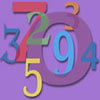Numbers are funny things. On the one hand, they seem utterly devoid of meaning: think of the sterility of bureaucracies ("Go to Window #14 and fill out form #3062") or the banality of an address like "25 20th Street." On the other hand, consider how numbers are used when we say things like, "Eighteen years' experience in the business"; "A $450,000 home"; or "This is our child. She's three."
Counting something makes it real to us: only when we have assigned it a quantity can we understand what it means to us and how we can use it. Imagine that you are given a chest full of gold coins. You thank your benefactor and take it home. As soon as the door is securely bolted, what's the first thing you do? Count them, of course. Sure, it feels great to be able to say, "I'm a rich man." But if you want to do something with your riches, you have to know: How much?
"And you shall count for yourselves from the morrow of the Shabbat, from the day on which you bring the Omer offering, seven complete weeks they shall be; until the morrow of the seventh week, you shall count fifty days... And you shall proclaim that very day a holy festival" (Leviticus 23:15-21)
The people of Israel departed Egypt on the 15th of Nissan, celebrated ever since as the first day of Passover. Seven weeks later, on the 6th of Sivan—marked on our calendar as the festival of Shavuot—we assembled at the foot of Mount Sinai and received the Torah from G‑d.
Every year, we retrace this journey with a 49-day "Counting of the Omer." Beginning on the second night of Passover, we count the days and weeks. "Today is one day to the Omer," we proclaim on the first night of the count. "Today is two days to the Omer," "Today is seven days, which are one week to the Omer", "Today is twenty-six days, which are three weeks and five days day to the Omer," and so on, until: "Today is forty-nine days, which are seven weeks to the Omer." The fiftieth day is Shavuot.
The Kabbalists explain that we each possess seven powers of the heart—love, awe, beauty, ambition, humility, bonding and regality—and that each of these seven powers includes elements of all seven. These are represented by the seven weeks and forty-nine days of the Omer count.
Every Passover, we are granted a treasure chest containing the greatest gift ever given to man—the gift of freedom. It is also a completely useless gift. What is freedom? What can be done with it? Nothing, unless we open the treasure chest and count its contents.
So on the second day of Passover, after we've taken home our treasure, we start counting. We count seven times seven, because the gift of freedom has been given to each of the seven powers and forty-nine dimensions of our soul. Indeed, what use is a capacity for love, if it is a slave to external influences and internal neurosis? Of what value is ambition, if we are its pawn rather than its master?
Each evening for the next seven weeks, we open our treasure chest and count another coin. We count our loving love, intimidating love, beautiful love, ambitious love, humble love, bonding love and regal love. We assign a number to the regality of our awe ("Today is fourteen days, which are two weeks to the Omer") and to the beauty of our humility ("Today is thirty-one days, which are four weeks and three days to the Omer").
We count them all—and then we present ourselves at Mount Sinai.







Join the Discussion